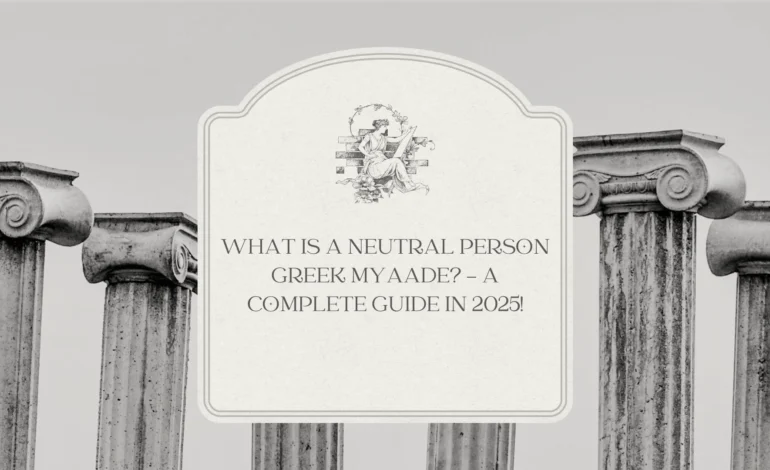
What is a Neutral Person Greek Myaade? – A complete guide in 2025!
Breaking it down into its components, we find three distinct elements: neutral person, Greek, and Myaade.
The phrase “neutral person Greek Myaade” is an intriguing combination of terms that may require deeper exploration to understand its meaning and significance.
To fully grasp its meaning, it is essential to analyze each part individually and then synthesize the information to form a complete interpretation.
Understanding a Neutral Person!
A neutral person is generally someone who does not take sides in conflicts, disputes, or debates. Neutrality is a state of being impartial, avoiding bias, and maintaining a balanced perspective in various situations. This concept is prevalent in diplomacy, ethics, and everyday human interactions.
In political or international affairs, neutrality refers to a stance of non-involvement, where a person or country refrains from supporting any particular party or faction. Similarly, in personal interactions, a neutral person avoids favouritism, making decisions based on fairness and logic rather than emotions or personal interests.
Greek Influence on the Concept of Neutrality!
The Greek aspect of this phrase could refer to multiple dimensions, including Greek philosophy, history, or cultural perspectives on neutrality. Ancient Greek philosophers such as Socrates, Plato, and Aristotle often emphasized rationality and balance in thought processes, which aligns with the idea of neutrality.
In ancient Greece, neutrality was sometimes seen in diplomatic relations between city-states. Some polis (city-states) maintained neutrality in conflicts between larger entities, positioning themselves as mediators or safe zones. The principle of Metron Ariston, which translates to “moderation is best,” was central to Greek thought, reinforcing the idea that extreme positions should be avoided for the sake of harmony and rational discourse.
Greek mythology also presents various deities and characters who embody neutrality. For example, Hermes, the messenger of the gods, was often seen as a neutral figure, delivering messages between opposing sides without personal involvement.
Exploring the Meaning of Myaade!
The term Myaade appears to be a unique or less commonly known word. If we consider linguistic roots, it could potentially be a transliteration from Greek or a term from a different cultural or philosophical context. While its exact definition remains unclear, it could be analyzed based on phonetic resemblance to Greek words or contextual usage in specific dialects.
If “Myaade” is a derivative of a Greek or related term, it might signify a principle, an individual, or a philosophy connected to neutrality. Alternatively, it could be a modern or informal term used in specific communities.
Synthesizing the Meaning: Neutral Person Greek Myaade!
By combining all three components, we can infer that “Neutral Person Greek Myaade” refers to an individual who embodies Greek philosophical principles of neutrality, balance, and impartiality. This person might:
- Follow a rational and balanced approach to decision-making.
- Avoid extreme positions in conflicts and maintain an objective stance.
- Utilize Greek philosophical teachings, such as those of Aristotle’s Golden Mean, to guide actions.
- Serve as a mediator or unbiased observer in social, political, or ethical dilemmas.
- Potentially relate to a specific cultural or linguistic identity associated with “Myaade.”
The Role of Neutrality in Modern Society!
In today’s world, neutrality plays a crucial role in various aspects of life, including politics, business, and personal relationships. Understanding the Greek philosophical foundation behind neutrality can provide valuable insights into how individuals and institutions can maintain fairness and objectivity.
- Political Neutrality
- Many countries and organizations adopt neutral policies to avoid involvement in conflicts.
- The concept of diplomatic neutrality, seen in nations like Switzerland, is rooted in principles of fairness and peacekeeping.
- Ethical Neutrality
- Ethical discussions often revolve around balancing personal values with universal principles.
- Philosophers like Kant and Aristotle emphasized the importance of reason and ethical neutrality in decision-making.
- Neutrality in Media and Journalism
- Unbiased reporting is essential for maintaining the integrity of information.
- Greek historical records and scholars like Herodotus set early standards for objective storytelling.
- Personal and Social Neutrality
- In daily life, adopting a neutral stance can help resolve conflicts and foster peaceful relationships.
- Practising emotional intelligence and self-restraint aligns with the Greek ideal of balance and moderation.
Challenges of Being a Neutral Person!
While neutrality has many advantages, it also comes with challenges:
- Accusations of Indifference: Neutral individuals may be perceived as passive or lacking strong convictions.
- Pressure from External Forces: Societal or peer pressure may push a neutral person to take a side.
- Ethical Dilemmas: Some situations require active intervention, making neutrality a difficult stance to maintain.
- Complexity of Objectivity: Complete neutrality may not always be achievable due to inherent biases and emotional factors.
The Influence of Greek Neutrality in Global Thought!
The Greek approach to neutrality has influenced various modern concepts in law, governance, and ethics. The Socratic Method, which encourages questioning and balanced reasoning, continues to shape educational systems and intellectual discourse. Additionally, principles from Stoicism, a school of thought emphasizing emotional control and impartiality, remain relevant in contemporary self-development practices.
FAQs:
What does “Neutral Person Greek Myaade” mean?
It is not a widely recognized term, but it may refer to a neutral stance in Greek culture or philosophy.
Is “Myaade” a Greek word?
“Myaade” does not appear to be a common Greek word, so its meaning might be specific to a niche context.
What is a neutral person in Greek philosophy?
A neutral person in Greek philosophy avoids extreme views and seeks balance in thoughts and actions.
Does Greek culture emphasize neutrality?
Greek culture values debate, but philosophers like Aristotle promoted balance and moderation in life.
How does neutrality relate to Greek ethics?
Greek ethics, especially Stoicism, encourage neutrality by promoting reason over emotional reactions.
Conclusion:
The phrase “Neutral Person Greek Myaade” encapsulates the idea of an individual who embodies the Greek philosophical tradition of balance, moderation, and impartiality. While the exact meaning of “Myaade” may require further linguistic exploration, the overall concept suggests a person who values rationality, fairness, and ethical neutrality. In a world filled with conflicting perspectives, understanding and applying these principles can lead to more harmonious interactions and well-reasoned decision-making.





